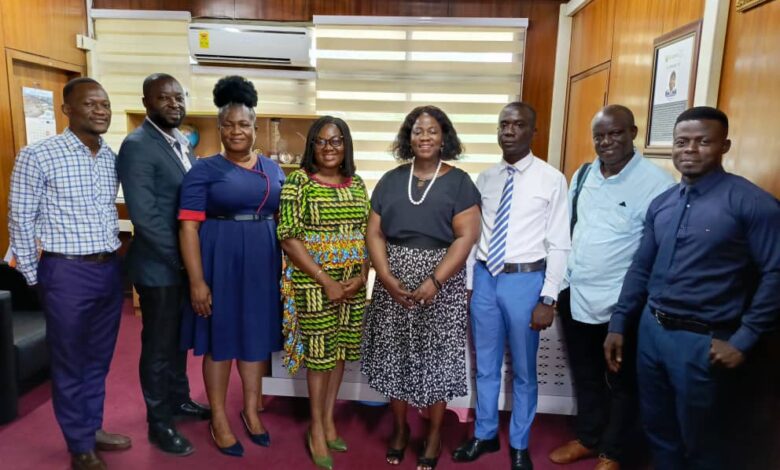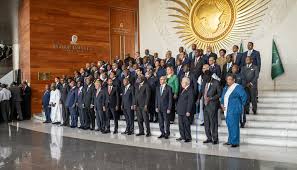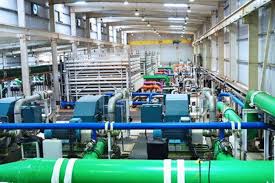CONIWAS gets result: CHRAJ begins investigations into its petition against gov’t for lack of WASH facilities in public and private schools
CONIWAS gets result: CHRAJ begins investigations into its petition against gov’t for lack of WASH facilities in public and private schools

The Commission on Human Rights and Administrative Justice (CHRAJ), says it has begun investigations into a petition it received from the Coalition of NGOs in Water and Sanitation (CONIWAS), against the Government of Ghana (Acting through the Ministry of Education, Ghana Education Service, National Schools Inspectorate Authority, Metropolitan, Municipal and District Assemblies and any relevant agency) for the lack of safe drinking water and improved toilet facilities (with Changing Rooms) in Public and Private Basic Schools.
The Deputy Commissioner in charge of the Human Rights Department of the Commission, Mrs. Mary Adjeley Nartey, made this known when some members of the Coalition led by its Executive Secretary, Mrs. Basilia Nanbigne, called on her at the Commission.

The members of the Coalition were at Commission to get an update on the petition it sent to the Commission on 8th June 2022.
Mrs. Nartey, addressing the group, assured them that her outfit is working assiduously on the petition which she said has been extended to cover other areas to ensure that the issues raised in the petition are solved holistically.
Mrs. Nanbigne thanked the Deputy Commissioner in charge of the Human Rights Department and her team and promised her of CONIWAS’s readiness to assist the team to do diligent work.
“The Coalition is very grateful to you and your team for the work done so far. We are of high hopes that the commission will come up with a roadmap by the end of its work to address the lack of safe drinking water and improved toilet facilities (with Changing Rooms) in Public and Private Basic Schools.” The Executive Secretary of CONIWAS added.
Below is the full Petition
8th June 2022
The Commissioner
CHRAJ
- O. Box AC 489
Accra
Dear Sir,
A PETITION AGAINST THE GOVERNMENT OF GHANA (ACTING THROUGH THE MINISTRY OF EDUCATION, GHANA EDUCATION SERVICE, NATIONAL SCHOOLS INSPECTORATE AUTHORITY, METROPOLITAN, MUNICIPAL AND DISTRICT ASSEMBLIES AND ANY RELEVANT AGENCY) FOR THE LACK OF SAFE DRINKING WATER AND IMPROVED TOILET FACILITIES (WITH CHANGING ROOMS) IN PUBLIC AND PRIVATE BASIC SCHOOLS
The Coalition of NGOs in Water and Sanitation (CONIWAS), under its Rights to Water, Sanitation and Hygiene (WASH) services Advocacy Project conducted a desk study into the Education Management Information System (EMIS). This information system (EMIS) compiles data on all public and private basic schools with and without safe drinking water, improved toilet facilities and urinals.
Our study of the EMIS 2020 reveals that 25% (5,471) of public basic schools lack access to safe drinking water, 26% (5,725) do not have toilet facilities, while 31% (6,843) lack access to urinals. In private basic schools where the situation is a little better, 17% (1,966) lack access to safe drinking water, 11% (1,273) do not have access to toilet facilities, while 16% (1,840) have no urinals.
Research reveals that the lack of access to these basic school infrastructure promotes absenteeism, truancy, loss of teaching and learning time, and generally poor academic performance. Sadly, even some public basic school infrastructure which were recently constructed are without safe drinking water, toilet facilities and urinals. Indeed, 9 out of 10 girls in Ghana regularly miss school during menstrual periods[1].
This is because such girls who have reached the age of puberty do not find the school environment safe or conducive.
It is our considered opinion and belief as a coalition that this is at the core of the right to education and dignity. The lack of access to these basic facilities therefore violates the foundational human right to education and dignity of these thousands of children who are affected by this unfortunate situation.
Again, it is our firm contention that Government of Ghana, acting through the Ministry of Education (MOE), Ghana Education Service (GES), National Schools Inspectorate Authority (NASIA) and Metropolitan, Municipal and District Assemblies (MMDAs) and any other relevant body, are violating their rights to health and life. When children are in school and have no water to drink, no toilets to empty their bowels and no water to wash their hands, their health and wellbeing are obviously compromised and their life is equally threatened.
This is against Article 13(1) of the 1992 constitution which reads “no person shall be deprived of his life intentionally except in the exercise of the execution of a sentence of a court in respect of a criminal offence under the laws of Ghana of which he has been convicted”.
Our demands include:
- Further investigations by CHRAJ to establish the number of public and private basic schools without access to safe drinking water, toilet facilities and urinals.
- CHRAJ may widen its scope to include Senior High Schools and tertiary institutions as it may deem fit.
- As a national human rights institution, CHRAJ should take all legally necessary steps to ensure the appropriate state agencies including MOE, GES, NASIA and MMDAs collaborate to provide safe drinking water, improved toilet facilities and urinals in all public and private basic schools within acceptable timelines.
- A declaration that no new public or private basic school infrastructure may be constructed without access to safe drinking water, improved toilet facilities, and urinals.
- In order to make the school environment conducive for girls who have reached the age of puberty, and to ensure that menstruating girls do not miss school, all school toilet facilities should have changing rooms for girls.
Attached in Excel format is the 2020 EMIS report for study.
It is our firm belief that our petition will be given the needed attention.
Yours faithfully;
Names of Petitioners:
Yaw Attah Arhin Basilia Nanbigne
Chairman of CONIWAS Executive Secretary – CONIWAS
[1] House, Sarah; Mahon, Therese; & Cavill, Sue. 2012. Menstrual Hygiene Matters; A resource for improving menstrual hygiene around the world, WaterAid




